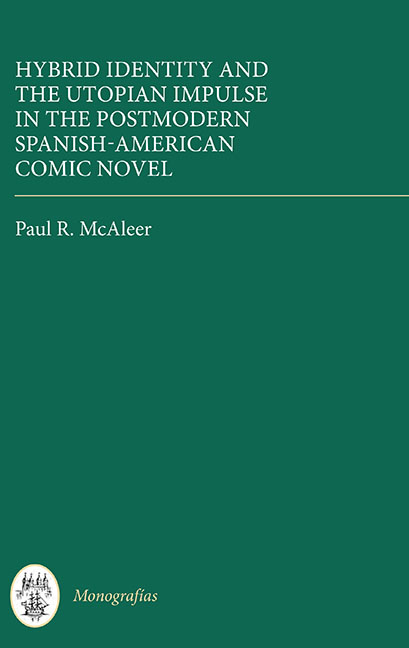Book contents
- Frontmatter
- Contents
- Acknowledgements
- 1 Contextualising the Debate: The European Comic Tradition and the Question of Context
- 2 Gustavo Sainz’s La princesa del Palacio de Hierro: Comedy and the Female Character in Transnational Mexico
- 3 Comic Identity and Cultural Exile in Bryce Echenique’s La vida exagerada de Martín Romaña
- 4 Black Comedy and Identity Loss in Fernando Vallejo’s La virgen de los sicarios: On the Road to Dystopia
- 5 Jaime Bayly’s La noche es virgen: Comic Queer Identities in the Era of Transnationalism
- Utopia, Comedy and Latin American Utopianism: Is This Really the End?
- Bibliography
- Index
4 - Black Comedy and Identity Loss in Fernando Vallejo’s La virgen de los sicarios: On the Road to Dystopia
Published online by Cambridge University Press: 07 May 2022
- Frontmatter
- Contents
- Acknowledgements
- 1 Contextualising the Debate: The European Comic Tradition and the Question of Context
- 2 Gustavo Sainz’s La princesa del Palacio de Hierro: Comedy and the Female Character in Transnational Mexico
- 3 Comic Identity and Cultural Exile in Bryce Echenique’s La vida exagerada de Martín Romaña
- 4 Black Comedy and Identity Loss in Fernando Vallejo’s La virgen de los sicarios: On the Road to Dystopia
- 5 Jaime Bayly’s La noche es virgen: Comic Queer Identities in the Era of Transnationalism
- Utopia, Comedy and Latin American Utopianism: Is This Really the End?
- Bibliography
- Index
Summary
The third novel of this study, Fernando Vallejo's La virgen de los sicarios (1994), constitutes yet another variation on the comic form and themes identified in the previous chapters.1 Following the general pattern of the texts discussed thus far, the novel inscribes the traditional characteristics of comedy while at the same time subverting and distorting them. However, in this particular example of comic fiction, the variations are considerably more profound and pronounced than anything we have seen up to this point. Indeed, so great is the distortion that at times it does not seem as if the novel is operating within the context of a comic tradition at all. But, as we shall see, it quite clearly is; or at least, in the sense that we have been using the word ‘comedy’ in this study, as a Menandrine form that articulates a utopian impulse, it is in part.
The reason for the dramatic display of deformation in Sicarios is the novel's affiliation with the other interconnected yet quite different comic tradition: the Menippean satire. The framework and features of the text straddle the two principal sources of comic literature. That this is the case should not be a surprise. According to Bakhtin, the Menippean satire had ‘an immense influence in the history of European novelistic prose’ (Poetics, p. 98). Thus we can presume that all modern novels, comic or not, are invested to a differing degree with the varied features and composite frameworks that this protean genre has subsumed throughout its long history.
The novel, then, and especially the comic novel is in part the progeny of the Menippean satire. However, in the case of Sicarios, there is an important point of difference between the novel's and its own appropriation of the Menippean satire's heterogeneous format. The difference can quite simply be found in the matter of degree. The building blocks of the modern novel may well stem from the Greco-Roman satire but, in comparison, Vallejo's text displays a far greater adherence to the Menippean (multi-)format. It constitutes a tangible resurgence of the old seriocomic tradition, or to be more precise the dystopian strain of that format.
- Type
- Chapter
- Information
- Hybrid Identity and the Utopian Impulse in the Postmodern Spanish-American Comic Novel , pp. 99 - 122Publisher: Boydell & BrewerPrint publication year: 2015



